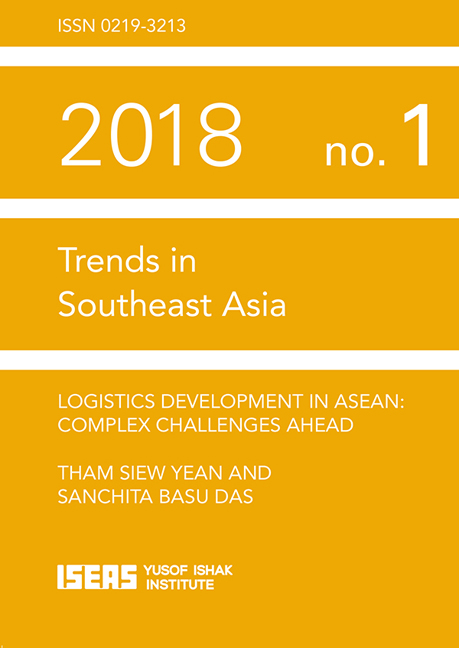Logistics Development in ASEAN: Complex Challenges Ahead
Published online by Cambridge University Press: 12 February 2019
Summary
INTRODUCTION
Logistics is a key enabler for economic growth and development. It enhances efficiencies in supply chain activities and lowers transaction cost and time between producers or between producers and consumers. A seamless logistics system improves connectivity both within and across countries. It links a country's centre of business activities to the peripheries and helps to distribute the benefits of economic growth regionally.
According to a market research report, the global logistics industry is valued at US$8.2 trillion in 2015, representing around 11 per cent of global Gross Domestic Product (GDP). This is expected to go up to US$15.5 trillion by 2023 at a compound annual growth rate of 7.5 per cent. Globally, road is the most widely used transport network due to its flexibility in operation and availability of door-to-door services. It accounted for 45 per cent of share in total worldwide logistics revenue in 2015. The Asia-Pacific countries, especially China, India, Singapore, Indonesia, Japan and Malaysia, led the global logistics market with 47 per cent of global share in 2015, though the market size of the United States, the United Kingdom, Germany and France cannot be ignored. The global
logistics market is highly fragmented with the top four players, Deutsche Post DHL, Ceva Logistics, UPS and FedEx, accounting for less than 15 per cent of the total market.
With globalization, the logistics industry has come to play an increasing role in each country's economic activities. Multinational corporations (MNCs) are no longer producing their goods in one single country. Instead, they are slicing their production process across several countries based on the comparative advantages of each country. Some MNCs are outsourcing business activities such as logistics and distribution to other firms (or third party), freeing them to focus more on their core business. This functional fragmentation is making the logistics sector an integral part of the overall economic activities in a country.
However, the logistics sector suffers from the lack of a common definition across countries. The U.S. Coalition of Services Industries defines logistics services sector as “the process of planning, implementing, managing and controlling the flow and storage of goods, services and related information from the point of origin to the point of consumption.”
- Type
- Chapter
- Information
- Logistics Development in ASEAN , pp. 1 - 36Publisher: ISEAS–Yusof Ishak InstitutePrint publication year: 2018

